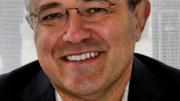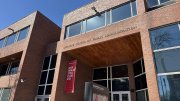Jeffrey Toobin ’82, J.D. ’86, who writes on legal matters for The New Yorker and appears on CNN as a legal analyst, gave the Class Day address at Harvard Law School on May 29. (The Law School webcast the full Class Day program.) Toobin, whose books include The Nine: Inside the Secret World of the Supreme Court (2008) and The Oath: The Obama White House and the Supreme Court (2012), bestowed ample attention on the court in his remarks. He noted anecdotally, for example, that his friend and law-school classmate, former Law School dean Elena Kagan, now an associate justice of the Supreme Court, had once received a disappointing grade in torts. “In the larger scheme of things, I don’t think it’s going to matter very much,” Toobin recalled counseling Kagan. He then asked his audience, “Was I right, or what?”
He also addressed weightier matters, such as the changing composition of the Court. He noted the retirement of associate justices John Paul Stevens, Sandra Day O’Connor, and David Souter ’61, LL.B. ’66, LL.D. ’10, observing that no one is likely to see “three more different people” than that trio. Yet, “all were moderate Republicans who left the Court completely alienated from the modern Republican party.” He explained that “the notion of moderate Republicanism has disappeared from the Supreme Court, just as it has from American life.” Toobin’s description of today’s court was sobering: he characterized it as a body “that now has five Republicans and four Democrats—and that tells you most of what you need to know.”
Toobin also reminisced about his own experience as a law student. He recalled his first class on his first day, criminal law with Alan Dershowitz (now Frankfurter professor of law), who announced to the students that, based on the history of Harvard Law School, “more of you will be criminal defendants than criminal lawyers.” Toobin called his law-school years “the greatest and richest educational experience of my life.” In his career as a journalist, he said, “I am a perpetual 1L [first-year law student].” He acknowledged the late Anthony Lewis ’48, NF ’57, (“Tony invented modern coverage of the Supreme Court”) and Laurence Tribe, now Loeb University Professor (“Constitutional law with Larry Tribe changed my life. I only wish the current Supreme Court had learned as much from Larry Tribe as I did.”) And he confessed that his favorite Supreme Court justice is David Souter—“so delightfully odd as a human being. He does not have a computer, he does not have a cell phone, he does not like electric light. Every day he has the same lunch—a cup of yogurt and an apple.”
Later in his remarks, Toobin turned to the emerging careers of his audience, first noting that “I work in cable news, so I am not afraid to say things that are painfully obvious.” In this case, that meant observing that “the legal economy is changing and it is hard to say that it is getting better.” Yet, he predicted that as Harvard Law alumni, they would readily find jobs. Even so, “not one of my law-school classmates is doing now what they expected to be doing at graduation….Well, there might be one, but Elena is in a separate category.” Toobin told the young lawyers that “You are going to have to make up your careers as you go along.” In his own case, for example, “there was no such thing as a TV legal analyst before 1995. You can credit O.J. Simpson for that.”









